A few weeks ago, I discussed the importance of maintaining healthy cortisol levels (the primary stress hormone) to discourage the storage of belly fat. But it turns out there is another important hormone that also influences how much fat is stored, and to an extent, where it is stored. That hormone is insulin.
Insulin: A key player in fat storage
You may have heard before that insulin encourages fat storage. While many hormone imbalances can contribute to an increased girth, elevated insulin levels prove to be a primary contributor. In fact, one of the diagnostic criteria for metabolic syndrome (which is associated with elevated insulin levels) is a waist circumference of 40 inches or more in men, and 35 inches or more in women. Metabolic syndrome is a collection of symptoms that have been shown to contribute to diabetes and heart disease. If a person has three out of five of these conditions, they are considered to have metabolic syndrome. These conditions include: a high waist circumference (abdominal obesity), high blood pressure, elevated fasting glucose, high serum triglycerides, and low high-density lipoprotein (HDL) levels.
In those with pre-diabetes or the beginning stages of diabetes, insulin levels are generally elevated as the body is pumping out more and more insulin to try to get sugar into the cells. Consequently, those with this type of blood sugar imbalance will have cells that are less responsive to insulin. This is also termed “insulin-resistant”. If diabetes goes unmanaged, the pancreas can “wear-out” over time, and as a result, secrete less insulin. At this stage, it becomes much more difficult to lower blood sugar without medication.
If you suspect you may have blood sugar dysregulation, I suggest you have your primary care physician order a fasting insulin test. This is a good test to have to evaluate how much insulin your body is producing in a fasting state. Many people can have normal fasting blood sugar, only to have a high fasting insulin. This is because the body is working overtime, producing more insulin, to get the blood sugar into normal ranges. Consequently, elevated insulin levels will prevent the body from optimally burning body fat. If you can’t seem to lose weight no matter what you do, this would be a good test to help in the evaluation process.
Even if you don’t get a blood test to determine how much insulin your body is producing, it can be advantageous to adopt a lifestyle that keeps insulin in check, blood sugar balanced, and fat burning optimized. Here is some guidance.
Tips to Lower Insulin and Improve Insulin Sensitivity
- Adopt a lower carbohydrate diet. Note, I didn’t say “no carb”, I said “lower carb”. Make sure all carbs you do eat are high in fiber, and spread out over the day. This helps to keep insulin levels lower, since insulin is released in response to carb intake. Some of the best carbs you can eat are vegetables, as they give you the most nutrition and fiber per carb gram.
- Stay away from refined carbs and sugar. You know – white bread, white rice, cookies…
- Optimize your fiber intake – aim for 30 plus grams per day and always make sure the carbs you eat are “high fiber carbs” – vegetables, low sugar fruits, and beans are my favs.
- Eat protein at every meal – protein helps to slow the digestion of carbohydrates, and therefore spikes in insulin. It also helps to lower hunger, thereby helping one to keep their overall intake in check. Insulin is released in response to protein intake, but not to the same degree as carbohydrates.
- Eat fat at every meal – fat does not cause a release in insulin. Eat foods like avocado, nuts, seeds, nut butters, olives, and olive oil.
- Engage in resistance training or weight training. This exercise increases the insulin receptor sites on muscles cells, and thereby makes the muscle cells more insulin sensitive. Also, the more muscle you have the better. Active muscle helps you metabolize the carbs you do eat. Build muscle!
- Engage in aerobic activity, which appears to be effective at increasing insulin sensitivity in obese individuals and those with type 2 diabetes.
- Supplement with chromium and magnesium. Chromium is part of something called the glucose tolerance factor, which is essential for allowing insulin to work at the cell level. Magnesium is also necessary for optimal insulin action.
- Sleep 7 – 9 hours each night.
- Apple cider vinegar has been credited with preventing blood sugar spikes, and consequently insulin spikes after meals that contain carbohydrate. One study found that people who took 2 T of vinegar with a high-carb meal experienced lower insulin levels 30 minutes after the meal. Vinegar may delay stomach emptying, and in this way help to reduce blood sugar spikes, leading to a more gradual release of sugar.
I hope you found this information helpful. As always, if you enjoyed this blog post, please share with family or friends.






